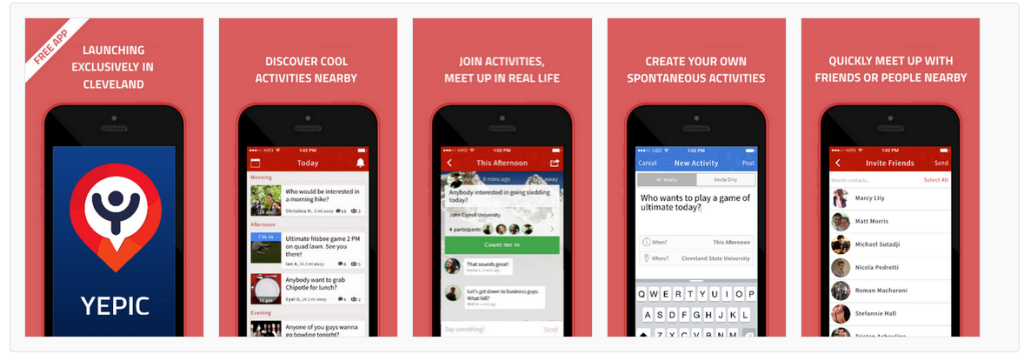About a year and a half ago, I heavily invested myself in founding my first tech startup, Yepic — a venture that ultimately failed. It was supposed to be an app for spontaneously finding things to do and finding people to do things with.
Screenshots of the Yepic User Interface
—
A Very Brief Background
Over the course of roughly a year, I recruited a technical co-founder, raised some money, built a small team of advisors, and hired a few contractors. Ultimately, at a tiny fraction of cost compared to most app startups, I got functional Yepic apps (with a UI I am very proud of) built for both iOS and Android — even though I’m not a programmer.
However, mid-way through my startup’s journey, it became clear I was more committed than my co-founder and we had a fallout. Following this turning point, I contracted other developers in attempt to continue my co-founder’s work and fix several significant bugs that were preventing Yepic from an official launch.
I hired three different developers, but after much struggling for each of them, they all came to the conclusion that my co-founder’s code was too messy to work with and that Yepic would have to be written from scratch — something that would take lots of money and time. My money, time, and motivation had dwindled to an all-time low. I realized without recruiting another skilled technical co-founder I got along with or without going for tens of thousands in new investment, the road ahead did not look good. Although I still believe in the potential of the idea, I decided to quit the project.
—
3 Lessons From Failure
I did many things right — but in the end, I failed at even getting Yepic to official public launch (though I did quietly launch and beta test this version with some bugs on the app store). Failure isn’t fun, but it teaches you a lot. Here are the 3 major lessons I learned from my failure.
1) Start small
Be minimalistic. Entrepreneurs often dream up grandiose visions of their app / website / business, and then spend tons of time readying their product — only to run out of money or to find out that there really wasn’t the market they were expecting. It’s important to begin with the end in mind, but trim down the features of your business concept or product to as barebones as possible — a Minimum Viable Product. (As an example, Yepic could have started as a social planing Facebook group — or just a simple iPhone app rather than both complex iPhone and Android apps). This will save you tons of time. It enables you to ship a product 10x faster, focus on quality of features rather than quantity, and quickly test a product’s potential. I really wish I had followed this philosophy more carefully.
Prove your worth. Anyone *good* willing to work with you (co-founders, team members, investors) will want to see you’re capable of skills essential to getting the startup off the ground. Before trying to woo others in, first do as much as you can on your own to show them you’re someone worth working with. I did a good job of this by lining up some investment, designing mockups, and building a static prototype. I should have done more though… such as building and marketing a large and active Facebook group or similar. The more you do alone before recruiting others to join you, the higher quality talent you will attract.
Fail as quickly as possible. It is best to launch your product super quick, get feedback, and then continuously iterate based upon what is working and what is not. Treat everything as an experiment. The sooner and quicker you fail and then improve, the closer you are to success. If you want to change the way people do things, do not hold onto a reputation of playing it safe… If you’re not willing to lose big, you won’t win big. Try big ideas quickly and see if they work before you waste a ton of time building something that doesn’t gain any traction (like I did). I even now apply this philosophy to friendships and dating (see this somewhat relevant Tim Ferriss article) — just make mistakes, break things, fix things, and go forward.
2) Invest in only amazing relationships
Find the right people. Choose to work with people who you love and who really care about the vision you have, not just the potential payoff. My technical co-founder and I probably wouldn’t have been good friends if not for the startup tying us together. I cared passionately about the mission of the startup whereas I think my co-founder was more interested in it because he just thought it was an idea that might take off. Startups are tough and take thousands of man hours, with lots of ups and downs… your early team needs to be compatible, persevering, and really believe in the vision you’re fighting for. (AirBNB founder Brian Chensky firmly believes in this concept and “looked through thousands of people and interviewed hundreds” before hiring AirBNB’s first engineer.) My co-founder and I were not the right fit, and our relationship ended up straining the startup instead of propelling it forward. Learn from my mistake here and only invest in amazing relationships that you feel great about.
Go 50/50 — with a cliff. One of my Silicon Valley advisors strongly suggested I offer my co-founder 50/50 equity — and implement a cliff (which is SUPER important in case a fall-out does occur). He said, “it’s better to have a little of a lot than a lot of a little”. I totally agree with him now and really regret not following his advice at the time. I should have offered my co-founder 50/50 monetary (but not control) stake from the onset, giving him feelings of ownership and skin in the game. Instead, I valued myself as more crucial to the company which (right or wrong) set things off on the wrong footing and helped set us more against each other than together against the world. Evem though a 50/50 equity split is not always the right decision, make sure you do not come across as greedy when working with others.
Create accountability. Keep everyone accountable and on the same page regarding expectations and what happens if expectations are not met. Incentivize success. Part of accountability means having the discipline to make challenging decisions if objectives are not being met — and knowing this now, I should have cut my losses with my co-founder months and months before we eventually split. I should have also made sure he was accountable to creating clean code with notes so that another developer could take over if need arose — which it did. Create clear agreements with others that have clear consequences if specific objectives are not met.
3) Be a decisive leader
Deal with sensitive issues. Being a founder of a startup requires making many decisions. You will make good calls and bad calls. Don’t be afraid to make mistakes, but do be afraid of timidity and indecisiveness. You have to learn a lot “on the job” when forming your own company, but this should be no excuse for not making decisions confidently and bringing small issues to the table before they become big ones. When negotiating equity with my co-founder, I was really bad in wanting to keep pushing things off. A leader should resolve issues quickly and take initiative in making respectable win-win decisions, not be weak and avoid any potential conflict. I learned a lot here.
Know when to cut your losses. Sometimes the circumstances just aren’t right and you need to throw in the towel, for yourself and for those following and / or investing in you. You should be getting a certain amount of output for your input. Things started off great with Yepic, but really fell flat at certain point — even though an official launch day always seemed only a few bugs away (an illusion). Looking back, I should have cut ties with my co-founder much earlier than I did and I should have abandoned the idea of working with his code much earlier than I did. Some mistakes are less fixable than others. But other opportunities always exist and you can take what you’ve learned other places. Because I value perseverance as one of my strongest qualities and became so passionate about the project, this lesson (especially quitting at the end) was my hardest.
—
Conclusion
My journey has been a rough ride, but there is no doubt that it has been an amazingly valuable educational experience. I am very appreciative to everyone who has been supportive: my investment partner, advisors, friends, and Yepic’s beta testers. I may re-evaluate coming back to this project another time, if someone else has not already figured the spontaneous social planning space out. But for now, I am moving on to other projects.
I hope this post has been somewhat helpful or inspiring (failure is inspiring) — or at least interesting. My advice to anyone thinking of starting up their own company is… do it. Go, dream big, have fun, and figure it out as you along. You may or may not succeed, but even if you don’t, you’ll learn a lot — and you’ll be more prepared for the next time.

